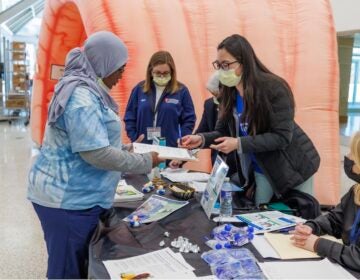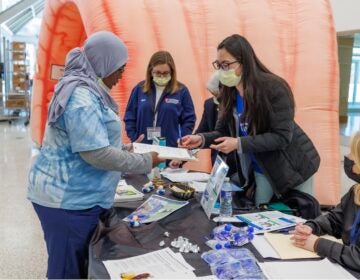Chadwick Boseman’s death was a surprise, but colon cancer deaths among Black men are all too common
A combination of things — access to primary care, chronic health conditions and environmental factors — may be to blame, but researchers still can’t say.

File photo dated March 4, 2018 of Chadwick Boseman arriving for the 90th annual Academy Awards (Oscars) held at the Dolby Theatre in Los Angeles, CA. (Photo by Lionel Hahn/Abaca/Sipa USA via AP Images)
The death of 43-year-old actor Chadwick Boseman may have come as a surprise to many who associate colon cancer with older adults. To oncologists, gastroenterologists and surgeons, however, it highlighted a sadly well-known racial disparity: that Black people are 20% more likely to develop colorectal cancer than white people, and that Black men are at the greatest risk — they are nearly 50% more likely to die of colon cancer than white men.
Younger people, too, are increasingly developing colon cancer: The incidence rate is still low, but it’s growing for people under 50. On top of that, the coronavirus pandemic has likely made things worse, since routine care designed to catch the disease early was put on hold for months.
Researchers and doctors don’t know why colorectal cancer is more common among Black Americans, but it’s likely a combination of factors. Other chronic health conditions can increase the risk for colon cancer, such as obesity, which affects African Americans at disproportionate rates. The cancer could be caused by genetic conditions that run in families, or environmental factors like diet and exposure to air pollution.
Frank Friedenberg, chief of gastroenterology and hepatology at Temple University Hospital, said he thinks the biggest obstacle for Temple’s largely low-income, largely Black patient population begins with low access to primary care, making referrals to specialty care harder to come by.
“The primary care physician says, ‘Hey, you’re 45 or 50, go and do a colonoscopy,” said Friedenberg. “I think the biggest unmet need in our population is really good primary care.”
Primary care physicians are few and far between in Philadelphia’s poorest neighborhoods. With Medicaid and Medicare reimbursement rates lower than private insurance, incentives are low for primary care doctors in private practice to accept patients enrolled in Medicaid.
Even with insurance, specialist appointments like colonoscopies often require expensive copays. That means patients will often delay seeking care for symptoms, and the longer they wait, the harder the cancer is to treat.
“People wait — they have other priorities in an impoverished community,” said Fridenberg. “Are you gonna eat that week, or are you gonna see the gastroenterologist?”
Philadelphia is home to four of the country’s National Cancer Institute-designated cancer centers. One more in Pittsburgh makes the state a draw for cancer treatment and research. That may help explain why the racial disparities aren’t as great in the region as they are nationwide: In 2017, the last year for which incidence data is available, the rate of new colorectal cancer was actually slightly higher among white men than Black men, and both were below the national average. The same is true in Philadelphia, where white men developed colorectal cancer at higher rates than Black men. The mortality rate for Black men was still higher, though.
Rising cases for those under 50
Doctors largely think of colorectal cancer as preventable. Routine screenings that detect benign polyps before they become malignant can all but eliminate the risk.
Over the last decade, the number of new colorectal cancer cases has decreased among older people — probably because of more regular screenings. But during the same period, cases in people under 50 have crept up. Doctors don’t know exactly why, but they guess it could be due to some combination of diet and genetics.
Edith Mitchell, associate director of the Sidney Kimmel Cancer Center, said that, like African Americans, younger patients are often diagnosed at later stages of the disease. For people under 50, this is less about access to health care and more that doctors and patients alike don’t flag blood in the stool, irregular bowels or cramping as symptoms of colon cancer at such a young age.
“The patient doesn’t come in with a sign that says, ‘I’ve got colon and rectal cancer,’” said Mitchell, who also heads the Center to Eliminate Cancer Disparities at Thomas Jefferson University. “Therefore, with younger individuals with abdominal complaints, we need to think about colon cancer among the potential diagnoses.”
As the incidences of cases in people under 50 has crept up, various organizations have shifted their guidelines to recommend that anyone over 45 begin getting routinely screened.
‘Other diseases don’t stop’
From March through June, all elective procedures in hospitals across the Philadelphia region came to a halt to make room for a potential surge of acutely ill COVID-19 patients. That meant procedures such as colonoscopies, already a challenge to access for low-income people of color, were even harder to get.
“Other diseases don’t stop — they don’t wait because of COVID,” said James Walter, a gastroenterologist at Einstein Medical center. “That short period of time where elective procedures had to be delayed for public health reasons will certainly impact patients in ways we just don’t entirely know.”
Steven J. McClane is head of colorectal surgery at Cooper University Hospital’s MD Anderson Cancer Center. From April to July, he saw about a third of the patients he usually does for colorectal surgery. Normally, those patients are referred to him after they’ve been screened for something that needs to be removed.
“Unfortunately, what’s going to happen is these patients are going to be found later and potentially have more advanced cancers,” McClane said.
Friedenberg estimated that Temple performs roughly 437 non-emergency colonoscopies a month, meaning nearly 2,000 were canceled due to the suspension of elective procedures. With the hospital as busy as it is again, he said it’s hard to imagine how they’ll ever catch up.

Get daily updates from WHYY News!
WHYY is your source for fact-based, in-depth journalism and information. As a nonprofit organization, we rely on financial support from readers like you. Please give today.





